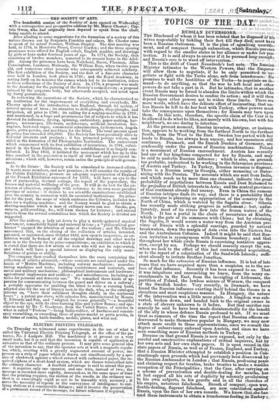Thezibenthath session of the Sooidty of Arts opened on Wednesday,
with a retrospective and prospective address by lkfr. Hirrry Chester ; Cap- tain Owen, who, had originally been deputed to speak from the char,
being unable to attend. • - After alluding to some suggestions for the formation of a society of this nature thrown out by Benjamin Franklin and others, Mr. Chester came to speak of its actual founder, William Shipley. The first meeting was held, in 1754, in Henrietta Street, Covent Garden ; and the three opening premiums were offered for English cobalt, English madder, and drawings by girls or boys under fourteen years of age. In 1774, the Society, then consisting of twelve members, removed to its present home in the Adel- phi. Among the prizemen have been Nollekens, Bacon, Flaxman, Allan Cunningham, Landseer, Mulready, Sir William Ross, when twelve years old, and numerous other persons who subsequently achieved celebrity. The first exhibition of the Society, and the first of a fine-arts character ever held in London, took place in 1760; and the Royal Academy, in setting forth on its minutes the causes which led to its institution, refers to these collections of the Society of Arts. In 1776, a proposal was made to the Academy for the painting of the Society's cow;icil-room ; a proposal refused by the corporate body, but afterwards accepted, and acted upon by Barry gratuitously. In reviewing the operations of the Society, which he characterized as an institution for the improvement of everything and everybody, Mr. -Chester spoke of the introduction into England, through its agency, of several species of trees ; its attention to drill-plonghs, dray-ploughs, and irrigation, all prior to 1790; its calling for a reaping-machine in 1793; and mentioned, in a huge and promiscuous list of subjects to which it has devoted its influence, dyeing, spinning, embroidery, paper-making, har- poons, microscopes, life-boats, architecture, artificial incubation fire- engines, beet-root sugar, commercial schoolmasters, hydrometers, !Angola goats, gutta-percha, and machines for the blind. The total amount spent in prizes has exceeded 100,0001. The Society has been peculiarly alive to Colonial interests and products ; it has promoted postage reform, and aided in the formation of the Photographic Institution. The endeavours which commenced with its first exhibition of inventions, in 1761, culmi- nated in the Great Exhibition, to whose establishment it so largely con- tributed. In May 1852, it initiated the movement which has up to this time resulted in the association to itself of 309 local and provincial in- stitutions; which still, however, retain entire the principle of self-govern- ment.
As to the future : the Society will be stimulated to increased efforts. It wants more members, and new premises; it will consider the results of the Dublin Exhibition ; promote an adequate representation of England at the French Exhibition announced for 1855; will have an eye to the law of partnership, decimal coinage, the repeal of the paper-duty, the houses and material wellbeing of the poor. It will do its best for the ex- tension of education, especially with reference to its own more peculiar province of science : it desires to see scientific examinations established over the country in connexion with its associated institutions. Its prize- list for the year, the scope of which embraces the Colonies includes ten- ders for a washing-machine; and the Society would be glad to obtain a shaving-machine which a man of ordinary nerve can use. Smoke, gas carpets, gold-crushing, dm., will form themes for lectures ; and annual reports from the several committees into which the Society is divided are suggested. After the Midress, a lady sat down to play a newly-patented musical instrument, remarkably liquid and unisonal intone; a 'philosophical gas- burner" engaged the attention of some of the visitors ; and Mr. Chester announced that, on the closing of the collection of articles invented, patented, or registered, since October 1852, now open to inspection, an ex- hibition would be formed of all the original drawings and other works sent in to the Society for its prize-competitions ; an exhibition in which it is stated that there are few artists of note who will not be represented, and which will have a special interest as displaying the early mani- festations of genius or ability. The company then crushed themselves into the room containing the collection of articles aforesaid,—whose contents are catalogued under the heads of "Motive Machines, including railway mechanism ; manufac- turing machines and tools; building contrivances and materials, and naval and military mechanism ; philosophical instruments and hardware ; agricultural implements and saddlery ; and miscellaneous, including ar- ticles for personal and domestic use.' We remarked three kinds of ap- paratus for communicating between the guard and driver on a railway ; a portable apparatus for enabling the blind to write a running hand, adapted also for the use of literary men in the dark, who, as the catalogue informs us, "have their sublimest thoughts chiefly in the nocturnal hours" ; a patent gas stove, with asbestos fire, manufactured by Messrs. T. Edwards and Son, and "adapted for rooms generally "—a beautiful object to the eye, with its close burning lilac and yellow flames ; and ape- .eimens sent by Mr. C. Goodyear, from the United States, of articles in what is called "Protean "—being India-rubber, of hardness and consist- ency resembling, or exceeding, those of papier-mache or gutta percha, in the forms of combo, knife-handles, medals, plates, and what not.


































 Previous page
Previous page